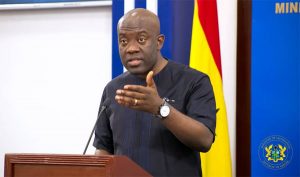The High Court has ordered the Governor of Bank of Ghana, Dr. Ernest Addison, to produce and tender in to the court, on March 10, 2022, the statement of accounts of defunct Capital Bank.
Lawyers for Ato Essien, the prosecuted founder of the Bank in receivership, prayed the court to compel the Central Bank Governor to produce the document.
It remains unclear the trajectory this statement of account will take the case to, but it remains Mr. Ato Essien’s position that the money he is being prosecuted for, remains in the accounts of Consolidated Bank.
The Presiding Judge, His Lordship Eric Kyei Baffuor, a Justice of the Court of Appeal, sitting as an additional High Court Judge, directed the order at the Central Bank Chief, who in turn is to direct the appropriate department of the Central Bank to produce the statement of accounts.
“I accede to the request of learned counsel for the 1st accused, and order the Registrar of the Court to seal a subpoena directed at the Governor of the Bank of Ghana [Dr. Ernest Addison] who shall direct the appropriate department of the Bank of Ghana that is in charge of the statement of accounts of commercial banks to produce the bank account of Capital bank (now in receivership) from June 2015 to August 2017.”
His Lordship further ordered that “an official of the Bank of Ghana is to appear in court on the 10th of March 2022, at 11am to tender the statement of account before the court.”
The BoG had asked the court to set aside a counterclaim by Mr. Ato Essien challenging a suit filed against him and 15 other shareholders by the Receivers of Capital Bank over their alleged role in the collapse of the bank.
In a ruling, the court, presided over by Justice George Koomson, at the time held that the application by the central bank seeking to stop the counterclaim by Essien, had no merit.
Collapse of Capital Bank
Capital Bank was one of seven indigenous banks whose licences were revoked by the BoG after they were declared insolvent following a massive clean-up of the financial sector by the Central Bank from 2017.
Under a purchase and assumption arrangement, the BoG allowed the state-owned bank, the GCB Bank, to take over Capital Bank and UT Bank in order to protect depositors’ funds and also enable them to stay afloat.
The central bank then merged the remaining five other indigenous banks into one entity known as the Consolidated Bank.
Among other reliefs, Essien wanted the court to declare the BoG’s revocation of the operating licence of Capital Bank as “capricious, arbitrary, unfair and against the rules of natural justice.”







